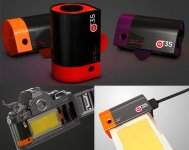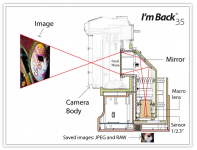filmtwit
Desperate but not serious
Apparently someone in Europe is still trying to make digital backs (or sorts) so you can turn your 35mm camera into a digital camera
https://imback.eu/home/
https://imback.eu/home/
boojum
Mentor
It looks very interesting. And it can resurrect those old honeys folks have stashed away from their film days. But what does the image look like? I see the price varies according to what is in the package and even the full boat is reasonable for what seems an unwieldy device. I'd want to see a bunch of images and some users remarks. But is sure does seem interesting.
Are you getting one?
Are you getting one?
robert blu
quiet photographer
It seems a good idea.
boojum
Mentor
It seems a good idea.
That's not a "yes."
keytarjunkie
no longer addicted
This crazy dude has been at it for years. It is a bulky, poorly designed product with a tiny sensor. The image quality is terrible, and it would remove any joy I get from actually using film cameras. You can preorder the product on indiegogo but there's no shipping date. He has received over a million dollars collecting preorders for more than two years for this product and hasn't shipped anything. If nothing else, that is immediately suspicious.
Eventually, someone will be able to manufacture a thin sensor that can be put inside a 35mm camera like this concept. Until then, I'll keep shooting film.

Eventually, someone will be able to manufacture a thin sensor that can be put inside a 35mm camera like this concept. Until then, I'll keep shooting film.

The inventor loves old cameras. I read about it when first introduced. It is similar in concept to a Nikon E3 that focused the light down to a smaller sensor and a Nikon Speed Magny Back that adapts the Nikon F to a full-frame Polaroid using 107 and 108 pack film.
Silicon Filmworks EFS-1 (I think that is it) tried to make a sensor to fit in a film cannister over 20 years ago. I read a "Post Mortem" stating that getting a battery to fit was a huge problem.
https://www.digitalkameramuseum.de/en/prototypes-rarities/item/silicon-film-efs
Silicon Filmworks EFS-1 (I think that is it) tried to make a sensor to fit in a film cannister over 20 years ago. I read a "Post Mortem" stating that getting a battery to fit was a huge problem.
https://www.digitalkameramuseum.de/en/prototypes-rarities/item/silicon-film-efs
Retro-Grouch
Well-known
I don't get it (but I can be dense). With the plethora of digital cameras available, in every size and shape and price point, why would anyone want to use such a kluge? Particularly with mirrorless cameras, virtually any SLR lens ever made can be adapted, so the impetus to use those lenses on a film camera with the "I'm Back" is dead in the water. And if one wants the experience of shooting a film camera, then use one loaded with film. There. I have spoken.
xayraa33
rangefinder user and fancier
There could be a niche market for such a thing, but really I think there are plenty of purpose made digital cameras that do a better job if you want digital and film cameras are fine as film cameras for us Luddites that like that sort of thing. In the coming decades using film will be as obscure and quaint and odd ball hobbyist as the handful of people doing daguerreotypes or wet plate photography today .
Retro-Grouch
Well-known
There could be a niche market for such a thing, but really I think there are plenty of purpose made digital cameras that do a better job if you want digital and film cameras are fine as film cameras for us Luddites that like that sort of thing. In the coming decades using film will be as obscure and quaint and odd ball hobbyist as the handful of people doing daguerreotypes or wet plate photography today .
"Quaint" isn't the first word I would use to describe my adherence to film, but I'm good with it. There is no "progress" in art, only change. The film medium suits me and what I do. There are contemporary artists/photographers addressing contemporary concerns with "quaint" processes. Take a look at Sally Mann's wet plate work, for example. But please, no digital vs. film nonsense; whatever works for you!
xayraa33
rangefinder user and fancier
"Quaint" isn't the first word I would use to describe my adherence to film, but I'm good with it. There is no "progress" in art, only change. The film medium suits me and what I do. There are contemporary artists/photographers addressing contemporary concerns with "quaint" processes. Take a look at Sally Mann's wet plate work, for example. But please, no digital vs. film nonsense; whatever works for you!
I am a film guy myself that own and use countless film cameras of all vintages and only own a small digital camera that was gifted to me in 2007.. no need to get up in arms as a Retro-Grouch.
Retro-Grouch
Well-known
I am a film guy myself that own and use countless film cameras of all vintages and only own a small digital camera that was gifted to me in 2007.. no need to get up in arms as a Retro-Grouch.
My apologies if you took my response as one of anger! I understood your post correctly, and my statement was meant to address those who actually do feel that film use is at best quaint. And my admonition to avoid the tired film/digital debate was meant in general terms, since it (still) seems to be ongoing here at RFF. Not up in arms at all; and certainly not with a fellow devotee of film. Sorry if it came across that way.
I don't know, but this idea done perfectly could be cool. I would love to use a roll of film that turned my favorite film cameras into a great digital camera. Unfortunately, it seems like fantasy to me. I just can't see it happening in my time. As to why? I actually prefer digital for color photography. Now why don't I use digital then? Well, I do. However, I still like some older cameras... I would imagine anyone who started with film but has switched to digital could feel similarly.
Capt. E
Established
Film is simply another medium to produce images that began with drawing on a cave wall. Even film has many different forms, film size, processing, etc. Ken Rockwell will still say film beats digital as to image quality. Not that he doesn't use digital tools as well. Heck, we're in the digital world right here on the forum.
flavio81
Well-known
See
for yourself:

Basically, the image is focused to a ground glass/focusing screen
The ground glass is focused by a lens into a relatively tiny sensor of unknown quality.
The problems with this approach, besides the huge size are:
- The image is focused to a ground glass: This introduces vignetting, the grain/surface of the focusing itself is introduced into the picture, and various optical aberrations of course. It also won't produce the same image as film; there's a difference between the depth of focus allowed by a focusing screen versus a film emulsion.
- An additional lens, introduces an extra optical system for further image degradation.
- Tiny sensor probably is not optimal for the (reduced) amount of light captured by the combination of focusing screen + optical system -- there must be a light loss of several stops there.
for yourself:

Basically, the image is focused to a ground glass/focusing screen
The ground glass is focused by a lens into a relatively tiny sensor of unknown quality.
The problems with this approach, besides the huge size are:
- The image is focused to a ground glass: This introduces vignetting, the grain/surface of the focusing itself is introduced into the picture, and various optical aberrations of course. It also won't produce the same image as film; there's a difference between the depth of focus allowed by a focusing screen versus a film emulsion.
- An additional lens, introduces an extra optical system for further image degradation.
- Tiny sensor probably is not optimal for the (reduced) amount of light captured by the combination of focusing screen + optical system -- there must be a light loss of several stops there.
Ken Rockwell will still say film beats digital as to image quality.
Good ol´Ken
ptpdprinter
Mentor
Ken Rockwell will still say film beats digital as to image quality.
Ken Rockwell will say just about anything.
I don't see the attraction of making a digital image with an old film camera. Seems sort of like an adapter you can use to play DVDs in your VCR.
Seems sort of like an adapter you can use to play DVDs in your VCR.
Yet, we have digital backs for medium format cameras.
OlivierAOP
medium format
See
for yourself:
filedata/fetch?id=4800728&d=1662389518
Basically, the image is focused to a ground glass/focusing screen
The ground glass is focused by a lens into a relatively tiny sensor of unknown quality.
The problems with this approach, besides the huge size are:
- The image is focused to a ground glass: This introduces vignetting, the grain/surface of the focusing itself is introduced into the picture, and various optical aberrations of course. It also won't produce the same image as film; there's a difference between the depth of focus allowed by a focusing screen versus a film emulsion.
- An additional lens, introduces an extra optical system for further image degradation.
- Tiny sensor probably is not optimal for the (reduced) amount of light captured by the combination of focusing screen + optical system -- there must be a light loss of several stops there.
Could they focus on the aerial image? That would remove the awful texture and light loss of a screen. But I think you would only see the exit pupil of the primary lens?
ptpdprinter
Mentor
Yet, we have digital backs for medium format cameras.
I was really thinking in terms of 35mm film cameras.
If I had an investment in Hasselblad bodies and lenses I would consider Hasselblad’s 50 MP digital back. Is anyone else currently making digital backs for medium format cameras? I am not really up on that market segment.
Chriscrawfordphoto
Real Men Shoot Film.
I was really thinking in terms of 35mm film cameras.
If I had an investment in Hasselblad bodies and lenses I would consider Hasselblad’s 50 MP digital back. Is anyone else currently making digital backs for medium format cameras? I am not really up on that market segment.
Phase One still makes medium format digital backs.
Share:
-
This site uses cookies to help personalise content, tailor your experience and to keep you logged in if you register.
By continuing to use this site, you are consenting to our use of cookies.

